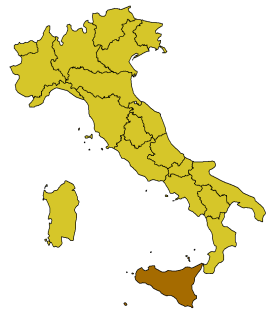Sicily (Italy: Sicilia) is a common name for Sicily (Region Sicilia), a special autonomous region of the Republic of Italy that combines the islands of Sicily and its surrounding islands.
Sicily is the largest island in the Mediterranean Sea, with an area of 25,420 km2. The island is also called Sicily (island), which is derived from English.
Sicily is Italy's largest state, accounting for less than a-twelfth of the country's total area. The symbol on the state flag is called Trinacria and consists of Medusa's face and three bare feet. The feet are said to represent the capes of Palermo, Messina and Siracusa. Trinacria is also the ancient name of Sicily and is derived from the Greek word "three capes".

Sicily occupies most of the state's area. Etna volcano is located on Sicily, near Catania.
The Aeolian Islands in the north, the Aegadian Islands in the west, Ustica in the northwest, and the Pelagie Islands in the southwest belong to the same administrative division as Sicily. However, the island of Malta in the south is another country called the Republic of Malta.
Sicily has been a producer of cereals and other crops for over 2,000 years. Among them, olives and wine are special products. The province of Caltanissetta was a major sulfur producer in the 19th century, but its output has been declining since the 1950s.
There was also a plan to build the Strait of Messina Bridge, which connects mainland Italy and Sicily (scheduled for completion in 2015), but the plan was canceled in 2006.